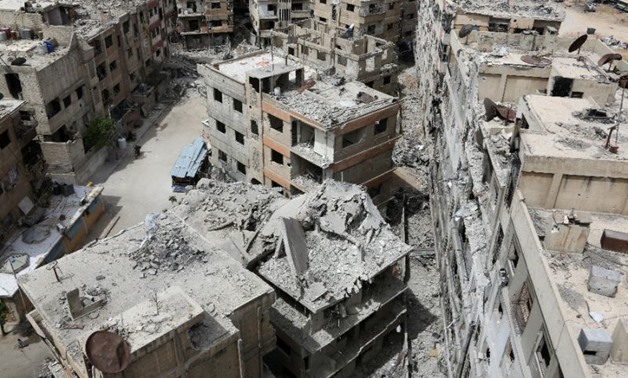
The former rebel Syrian town of Douma on the outskirts of Damascus is seen on April 17, 2018 after the Syrian army declared that all anti-regime forces have left Eastern Ghouta
SYRIA - 19 April 2018: The world's chemical arms watchdog froze its probe into an alleged chemical attack near Damascus Wednesday, demanding "unhindered access" after a United Nations reconnaissance mission came under fire.
Four days after reaching the Syrian capital, international inspectors had yet to begin their field work in Douma, where dozens were killed in a suspected gas attack widely blamed on President Bashar al-Assad's forces.
The Organisation for the Prohibition of Chemical Weapons said its fact-finding mission (FFM) would be forced to stay put in Damascus if its safety was not guaranteed.
Officers from the UN security agency (UNDSS) went on a reconnaissance mission Tuesday to Douma, a town that was controlled by rebels until Russian-backed regime forces fully retook it last week.
At one of two visited sites, "the team came under small arms fire and an explosive was detonated," Ahmet Uzumcu, the chief of the Netherlands-based OPCW, said in a statement.
He did not specify who might have opened fire on the UN reconnaissance mission on Tuesday, nor did any other official. The team was also forced to withdraw from another visited site due to security concerns.
Uzumcu said he would only consider deploying the team to Douma with UNDSS approval and if the inspectors had "unhindered access to the sites".
"This incident again highlights the highly volatile environment in which the FFM is having to work and the security risks our staff are facing," he said.
Uzumcu had earlier said Syrian authorities had offered the OPCW interviews with "22 witnesses who could be brought to Damascus" while security issues were worked out.
Syria's UN ambassador Bashar Jaafari told the Security Council on Tuesday that the OPCW experts would begin their investigation once they received the all-clear from the UN team.
"If this United Nations security team decides that the situation is sound in Douma, then the fact-finding mission will begin its work in Douma tomorrow," Jaafari said.
- Mission in limbo -
Holdout fighters from the Islamist group Jaish al-Islam said an April 7 attack by the regime was carried out with chemical munitions and forced them to accept a transfer deal.
That agreement was the death knell for a six-year opposition presence in Eastern Ghouta, a semi-rural area within mortar range of central Damascus.
The alleged chemical attack, grisly footage of which shocked the world, prompted a coordinated wave of unprecedented missile strikes by the United States, France and Britain against regime targets.
Syria's ally Russia was given prior notice and the missiles struck mostly empty buildings, in what many analysts saw as a hollow move that allowed all sides to save face.
The strikes were conducted just hours before OPCW inspectors arrived in the country with a mandate to determine the circumstances of the alleged chemical attack, but not to say who is responsible.
Damascus has consistently denied using chemical arms on April 7 and invited the OPCW to investigate. Its ally Moscow has accused the West and medics in Douma of staging the attack.
Now the future of the mission launched by the OPCW, which won the Nobel Peace Prize in 2013 for its efforts to destroy Syria's chemical stockpile, looked more uncertain than ever.
"At present, we do not know when the FFM team can be deployed to Douma," the OPCW chief said.
Western ambassadors to the organisation accused the Syrian regime of obstructing the mission.
Several experts have said it was likely Russian and Syrian forces that now control Douma have tried to remove or tampered with incriminating evidence.
- Burial site -
The "White Helmets", a Syrian rescue force that works in opposition-held areas, said it was working closely with the inspectors.
"We provided information on the burial place of those killed in the chemical attack," its chief Raed Saleh told AFP.
The White Helmets and local medics were the main source of information in the wake of the supposed chemical attack, but also during the broader two-month assault on Ghouta.
Another member of the force said he was worried proof that toxic substances had been used was being tampered with, particularly the burial site.
"The regime is hiding all the evidence," said the member, speaking on condition of anonymity.
He said the victims were buried in the city's east. On Tuesday, Syrian state news agency SANA said a "mass grave" had been found there, but did not specify what had been done with the bodies.
"It is essential they (the inspectors) visit the site of the attack -- all the evidence is there. Everything else is secondary," the White Helmets member said.
Top Jaish al-Islam official Mohammad Alloush accused the regime on Wednesday of "erasing proof of the chemical (attack) in Douma."
He specifically accused them of "storming cemeteries in search of the victims of chemical substances".


Comments
Leave a Comment